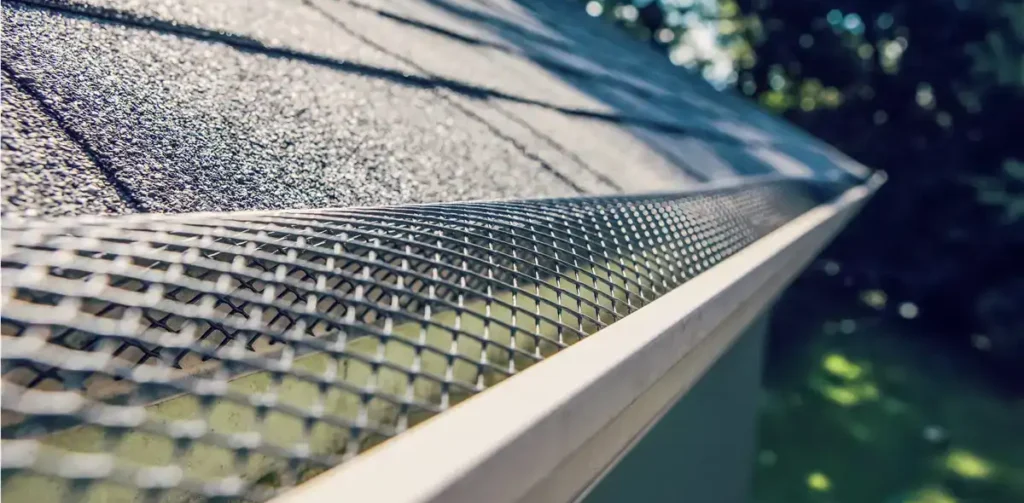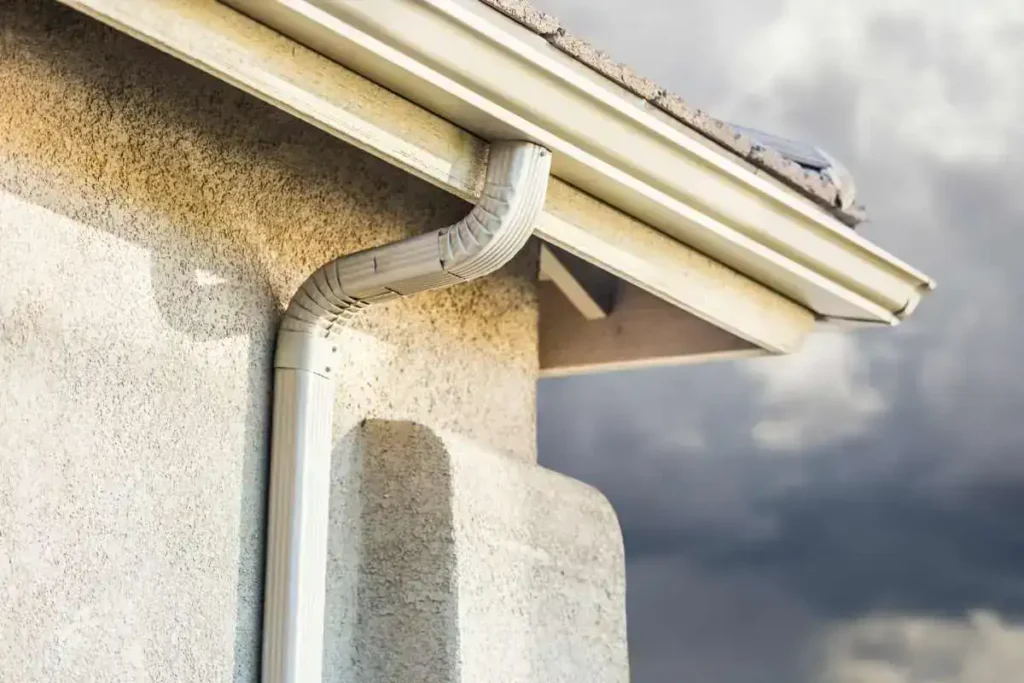When it comes to keeping the gutters clean and free of clogs, it is important to install the best gutter guard. Gutter guards are protective covers that prevent leaves, pine needles, and other debris from blocking your gutters. So many types of gutter guards are available. From micro-mesh to screen, every gutter guard has its own uses and benefits.
In this article, we’ll discuss 6 best types of gutter guards. It is important to understand the features and cost of each to choose the best for your needs. There are also some DIY gutter guard options available. You can try those to save money and effort.
What are Gutter Guards?

Gutter guards are covers or inserts designed to keep debris like leaves, twigs, and pine needles out of your gutters. By blocking unwanted items, the gutter guards help prevent clogs leading to water overflow, roof damage, or foundation issues. There are several types of gutter guards available for different purposes. From mesh to micro-mesh and foam gutters are used to block small to large particles going in the gutters.
Choosing the right gutter guard is necessary to keep your gutters clean and prevent clogs. It may depend on your specific needs, space requirements, and costs. There are also some DIY gutter guard options available. You can choose these options if you want to save money on material or labor.
6 Best Gutter Guard Types
The following are the 6 best gutter guard types. Each has its own uses and benefits. It is important to understand each to choose the best for you.
- Micro-Mesh
- Mesh
- Screen
- Reverse Curve/Surface Tension
- Brush
- Foam
Micro-Mesh Gutter Guards
Micro-mesh gutter guards have tightly woven screens to prevent debris like pine needles, leaves, and shingle grit from going into your gutters. These guards are best for heavy rainfall. They allow water flow while blocking out even the smallest particles. Micro-mesh options are durable and low-maintenance, which makes them one of the most popular types of gutter guards. As they block even the smallest particles, you do not need to clean the gutters frequently.
Mesh Gutter Guards
Mesh gutter guards have larger holes than micro-mesh. They allow the water to flow while keeping out larger debris like leaves and twigs. These gutter covers are suitable for most climates. Mesh guards are moderately priced, durable, and versatile. It fits well with different gutter and roof types. Although occasional cleaning is needed, they’re generally low-maintenance, which makes them a popular choice for many homeowners.
Screen Gutter Guards
Screen gutter guards use basic screens made from plastic or metal. They block larger debris while allowing water to pass through. Screen covers are easy to install, but they may need more frequent cleaning to keep smaller debris from clogging the gutters. This type is especially suitable for homeowners who want DIY and cost-effective gutter guards.
Reverse Curve/Surface Tension Gutter Guards
Reverse curve, or surface tension gutter guards, work by directing rainwater into the gutter while making the debris fall from the curve. This unique design prevents clogs effectively. Surface tension guards can be more expensive and often require professional installation. They offer strong gutter protection against clogs, helping homeowners avoid issues like water damage and frequent gutter cleaning. Their design and effectiveness make them a popular choice for long-term gutter maintenance.
Brush Gutter Guards
Brush gutter guards consist of bristles that fit into the gutter. These bristles catch debris while still allowing water to flow. They are budget-friendly and easy to install. They are one of the DIY gutter guard options. However, the bristles can trap leaves and smaller particles, so these guards may need frequent cleaning. Brush guards work best in areas with lighter debris.
Foam Gutter Guards
Foam gutter guards are made from a porous foam material that sits directly in the gutter, blocking debris while allowing rainwater to filter through. These guards are lightweight, easy to install, and one of the most budget-friendly options. Foam guards are designed to prevent leaves, twigs, and larger debris from clogging the gutter. However, since foam can trap dirt and smaller particles over time, it’s recommended to check and clean them frequently to ensure they remain effective. Foam gutter guards are a good choice for homeowners looking for low-cost clog prevention.
Materials Used in Gutter Guards
Gutter guards are made of different materials. They are chosen according to the needs and requirements.
1. Aluminum
- Aluminum is a strong material that doesn’t rust or corrode easily. It’s lightweight and easy to install.
- Most gutter guards, including micro-mesh and screen types, are made from aluminum.
- Aluminum is resistant to weather and doesn’t need frequent cleaning, making it low maintenance.
2. Stainless Steel gutter covers
- Stainless steel is even stronger than aluminum and offers excellent resistance to corrosion.
- Stainless steel gutter guards can last for many years, even in harsh weather conditions.
- Stainless steel is often used in high-end gutter guards like micro-mesh because of its strength and longevity.
3. Copper
- Copper gutter guards are known for their attractive, natural look that develops a greenish patina over time.
- Copper is highly resistant to rust and corrosion, making it perfect for long-term use.
- Copper guards are one of the more expensive options but are highly durable.
4. Plastic
- Plastic gutter guards are typically the most budget-friendly option.
- Plastic is easy to handle and install, making it a popular choice for DIY projects.
- While plastic is resistant to rust, it can become brittle over time, especially in extreme weather conditions.
5. Foam
- Some gutter guards are made of porous foam that sits inside the gutter, blocking debris and allowing water to flow through.
- Foam is one of the most cost-effective materials for gutter guards.
Gutter Guard Installation Cost
Gutter Guard |
Average Cost Per Linear Foot |
| Mesh | $3 to $7 per |
| Micro-mesh | $6 to $10 |
| Screen | $3 to $5 |
| Reverse Curve/Surface Tension | $9 to $17 |
| Brush | $2 to $5 |
| Foam | $2 to $4 |
Conclusion
Choosing the best gutter guard depends on your needs and budget. If you’re looking for something that blocks even the smallest debris, micro-mesh guards are a great choice. Mesh and screen guards are ideal for moderate protection and are more affordable.
For the long term, reverse curve guards are highly effective. If you want to save money, foam and brush guards are cost-friendly DIY options. Ultimately, it’s important to consider your climate, the amount of debris, and your budget to choose the best option accordingly.
FAQs
Q1. Best Gutter Guards for Pine Needles
Micro-mesh gutter guards are ideal for blocking pine needles as they have tiny holes that keep out fine debris.
Q2. Best Gutter Guard for Heavy Rain
For heavy rain, look for reverse curve gutter guards that direct water flow efficiently while keeping debris out.
Q3. Use of Micro-Mesh Gutter Guards
Micro-mesh guards use a fine mesh to prevent small debris from entering the gutters, making them effective against leaves, pine needles, and dirt.

